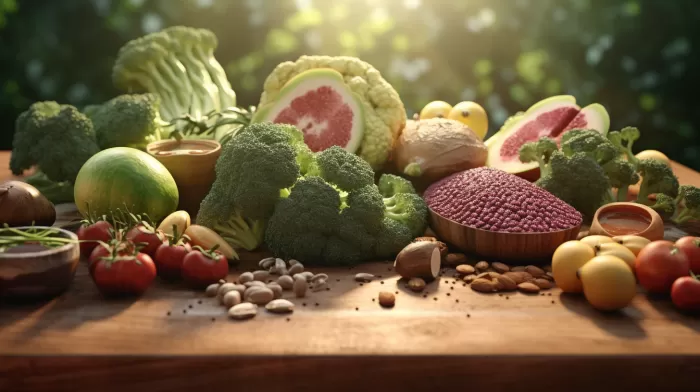Of all the strategies for fighting cancer and promoting overall health and well-being, few are as critical and profound as the practice of healthy eating and nutritional supplementation. With opposing recommendations in today’s dietary trends, choosing eating habits to help your body heal and stay healthy can seem a daunting task riddled with heated conflict and contradictory information. However, some recommendations have been clearly substantiated.
The Right Foods
Overwhelming evidence supports an organic, whole food diet emphasizing a variety of fresh fruits and vegetables for cancer prevention and recovery. Choosing organic is critical to avoid exposure to dangerous chemicals and pesticides which are known to contribute to cancer and can be stored in fat cells, including those in breast tissue. A plant-based diet that favors fiber, as well as omega-3-rich foods including nuts (such as walnuts), seeds (such as flaxseed) and wild salmon and sardines, is ideal. Specific vegetables, such as cruciferous vegetables (like broccoli, kale, chard, cabbage, and Brussels sprouts), which are high in sulfur, have been shown effective in supporting the fight against cancer.
Healthier Fats
Research links artificially “hydrogenated” trans fats — found in margarine and many crackers, cookies, baked goods, and fried foods — to increased breast cancer risk. Similarly, excess amounts of polyunsaturated omega-6 fats in vegetable oils have also been linked to breast cancer risk, despite their deceptively healthy reputation. Instead, stick with organic fish, flax, walnut, or olive oils, which have all been shown beneficial in reducing inflammation and cancer risk. And finally, avoid sugar and white flour products — they promote inflammation, suppress your immune system, and fuel cancer growth.
Be Wary of Chemicals
Proper hydration — at least six to eight glasses of fresh, clean water a day — is equally essential in the fight against any disease. Avoid tap water or bottled water. While the former often contains cancer-promoting chemicals like chlorine or fluoride, the latter may be just as dangerous (if not more so) due to estrogen-mimicking compounds imparted from plastic bottles.
Researched Nutrients for Fighting Breast Cancer
It is also critical to include an array of nutrients and botanicals that have been proven to help your body fight cancer and help prevent recurrence. Based on the latest scientific research and clinical applications, many different compounds and nutrients have shown significant success in the fight against breast cancer. Combining these nutrients in a strategic protocol allows the cancer to be attacked from all sides — to promote better health. They can be used at all stages and in conjunction with conventional treatment protocols to enhance efficacy and reduce side effects.
The two most important protocols are modified citrus pectin and a comprehensive breast care supplement. Modified Citrus Pectin has been proven in numerous peer-reviewed studies to help prevent cancer metastasis by directly attacking the tumor and blocking the spread of cancer cells to other areas of the body. In addition, MCP offers other health-promoting benefits, most notably the ability to help prevent and reverse the effects of chronic inflammation and fibrosis, supporting the fight against heart disease, kidney disease, arthritis, and many other chronic degenerative conditions. MCP is also helpful in the safe and effective chelation of heavy metals and environmental toxins from the body, which may help in the recovery of many illnesses, not least of all cancer.
A comprehensive breast care formula is a great way to support healthy breast cell growth and behavior in human breast cells. The right combination of targeted ingredients can offer dynamic, comprehensive support for breast health on multiple levels: cellular, genetic, immune, hormonal and more — while promoting overall vitality at the same time.
In addition, vitamins and minerals are among your best allies in the fight against breast cancer, in particular the powerful antioxidants vitamin A and C. Research shows that the two work synergistically in combination to inhibit human breast cancer cell proliferation. Similar results have been seen with vitamin E and D3 — the latter of which is the most bioavailable form of supplemental vitamin D. Adequate levels of all of these vitamins are critical if you want to stay cancer-free, along with the trace elements zinc, selenium, and iodine — all of which are linked with lower rates of cancer in population studies.
Conclusion
Proper diet and nutritional supplementation are critical tools in the fight against cancer. If you or someone you love has been diagnosed with this disease, the most important thing to remember is that there are choices available for you to optimize your recovery. And where there are choices, there is always hope.



